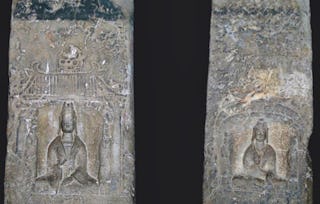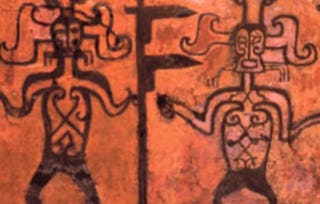Cette séquence de quatre cours proposera une approche pluridisciplinaire de l'étude de l'histoire culturelle chinoise conçue comme une succession de modes de rationalité (philosophique, bureaucratique et économique). L'accent sera mis sur les moments de changement de paradigme d'un mode de rationalité à un autre. Pour chacun de ces moments, les faits et artefacts culturels - pensée, littérature, rituel - seront examinés en relation avec les systèmes sociaux, politiques et économiques changeants. Les deux premiers cours couvriront les périodes des États combattants (481-256 avant notre ère) et de la période de division (220-589 après notre ère), avec une brève excursion dans les Han (206 avant notre ère-220 après notre ère). Les États combattants ont jeté les bases sociales et culturelles de l'émergence du mode impérial de rationalité ; la période de division a vu la "conquête" bouddhiste de la Chine et l'émergence d'une rationalité définie par l'opposition des Trois Enseignements au chamanisme, c'est-à-dire par un contraste clair entre culture élitaire et culture populaire. Les troisième et quatrième cours se concentreront sur l'émergence de la Chine moderne dans le Song-Yuan (960-1368) et de la Chine d'aujourd'hui, de 1850 à nos jours. Nous verrons comment l'attaque moderne contre la religion, redéfinie comme "superstition", a conduit non seulement à des mouvements de réforme religieuse, mais aussi à une société dans laquelle la science et la nation sont devenues les principaux systèmes de valeurs promus par l'État. Les cours sont énumérés ci-dessous : Une histoire culturelle critique de la Chine - La Chine primitive I : Changement intellectuel dans les États combattants et les Han (481 BCE-220 CE) Histoire culturelle critique de la Chine - Chine ancienne II : Transformation religieuse dans la période de division (220-589 CE) Histoire culturelle critique de la Chine - Chine moderne I : Religion et pensée sous les Song, les Jin et les Yuan (960-1368) Une histoire culturelle critique de la Chine - Chine moderne II : Structurer les valeurs (1850-2015)

Structurer les valeurs dans la Chine moderne

Structurer les valeurs dans la Chine moderne

Instructeur : Prof. John Lagerwey
5 228 déjà inscrits
Inclus avec
36 avis
Compétences que vous acquerrez
- Catégorie : Sociologie
- Catégorie : Sciences sociales
- Catégorie : Diversité culturelle
- Catégorie : Histoire ancienne
- Catégorie : Sciences politiques
- Catégorie : Économie
- Catégorie : Science et recherche
- Catégorie : Culture
- Catégorie : Études sociales
- Catégorie : Histoire du monde
- Catégorie : Recherche
Détails à connaître

Ajouter à votre profil LinkedIn
39 devoirs
Découvrez comment les employés des entreprises prestigieuses maîtrisent des compétences recherchées

Il y a 7 modules dans ce cours
Ce module explique comment la science, le marché et la nation sont devenus les nouvelles valeurs structurantes de l'élite intellectuelle au 20e siècle et comment cela a conduit à la destruction des religions traditionnelles ; comment ces religions ont résisté aux nouvelles valeurs et les ont intégrées.
Inclus
7 vidéos7 devoirs
Ce module présente comment la vision traditionnelle chinoise du rôle du gouvernement a milité contre le développement de l'économie de marché, comment la science économique est née dans la Chine du 20e siècle et comment elle a profondément modifié la pratique du gouvernement et la façon dont la subjectivité humaine est comprise.
Inclus
2 vidéos2 devoirs
Nous allons apprendre la distinction entre la science et le scientisme, comment le scientisme a été utilisé pour justifier le rejet des religions traditionnelles, et comment une évaluation plus précise de la nature de la science rouvre un espace pour des préoccupations morales et religieuses plus traditionnelles.
Inclus
4 vidéos4 devoirs
Ce module traite du rôle des préjugés sexistes au sein de l'élite intellectuelle du 20e siècle et de la manière dont diverses traditions religieuses ont, au contraire, favorisé l'émancipation des femmes face au "patriarcat public".
Inclus
7 vidéos7 devoirs
Ce module présente comment les mouvements religieux laïcs, en particulier les groupes d'écriture spirituelle, ont répondu à la crise de la société chinoise aux XIXe et XXe siècles ; comment des groupes comme le Yiguandao sont passés de la répression politique à l'acceptation ; et comment la charité dans la Chine moderne est indissociable de l'histoire de ces organisations laïques.
Inclus
6 vidéos6 devoirs
Ce module présente le pouvoir d'attraction du protestantisme charismatique aujourd'hui, en particulier pour les femmes, ses origines essentiellement autochtones et ses similitudes avec d'autres formes de religion populaire.
Inclus
4 vidéos4 devoirs
Ce module présente les différences entre le dualisme chinois et le dualisme occidental et leur impact sur les différents systèmes d'écriture ; la signification des termes "patriarcal" et "humaniste" appliqués à la culture chinoise ; la façon dont l'élite chinoise et la culture populaire ont été séparées par un large fossé qui n'a pas encore été comblé.
Inclus
9 vidéos9 devoirs
Instructeur

Offert par
En savoir plus sur Histoire
 Statut : Prévisualisation
Statut : PrévisualisationThe Chinese University of Hong Kong
 Statut : Prévisualisation
Statut : PrévisualisationThe Chinese University of Hong Kong
 Statut : Prévisualisation
Statut : PrévisualisationThe Chinese University of Hong Kong
 Statut : Prévisualisation
Statut : PrévisualisationNanjing University
Pour quelles raisons les étudiants sur Coursera nous choisissent-ils pour leur carrière ?

Felipe M.

Jennifer J.

Larry W.

Chaitanya A.
Avis des étudiants
- 5 stars
77,77 %
- 4 stars
19,44 %
- 3 stars
0 %
- 2 stars
2,77 %
- 1 star
0 %
Affichage de 3 sur 36
Révisé le 26 mai 2021
I absolutely loved this course, it is really important to approach to the philosophical and religious structures.
Révisé le 2 oct. 2020
This course teaches me a lot about how belief systems and religion shape values in our society. The course was comprehensive, it gives an impression of acquired great knowledge.
Révisé le 28 oct. 2022
Very Interesting, and the lessons were engaging and enjoyable

Ouvrez de nouvelles portes avec Coursera Plus
Accès illimité à 10,000+ cours de niveau international, projets pratiques et programmes de certification prêts à l'emploi - tous inclus dans votre abonnement.
Faites progresser votre carrière avec un diplôme en ligne
Obtenez un diplôme auprès d’universités de renommée mondiale - 100 % en ligne
Rejoignez plus de 3 400 entreprises mondiales qui ont choisi Coursera pour les affaires
Améliorez les compétences de vos employés pour exceller dans l’économie numérique
Foire Aux Questions
Pour accéder aux supports de cours, aux devoirs et pour obtenir un certificat, vous devez acheter l'expérience de certificat lorsque vous vous inscrivez à un cours. Vous pouvez essayer un essai gratuit ou demander une aide financière. Le cours peut proposer l'option "Cours complet, pas de certificat". Cette option vous permet de consulter tous les supports de cours, de soumettre les évaluations requises et d'obtenir une note finale. Cela signifie également que vous ne pourrez pas acheter un certificat d'expérience.
Lorsque vous achetez un certificat, vous avez accès à tous les supports de cours, y compris les devoirs notés. Une fois le cours terminé, votre certificat électronique sera ajouté à votre page de réalisations - à partir de là, vous pouvez imprimer votre certificat ou l'ajouter à votre profil LinkedIn.
Oui, pour certains programmes de formation, vous pouvez demander une aide financière ou une bourse si vous n'avez pas les moyens de payer les frais d'inscription. Si une aide financière ou une bourse est disponible pour votre programme de formation, vous trouverez un lien de demande sur la page de description.
Plus de questions
Aide financière disponible,

